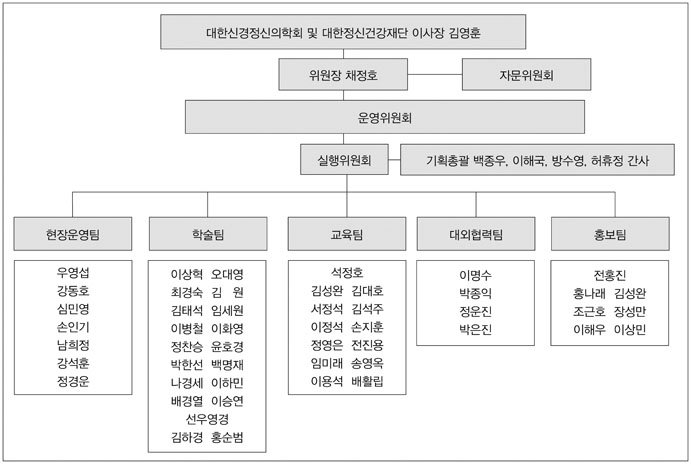J Korean Neuropsychiatr Assoc.
2015 Feb;54(1):1-5. 10.4306/jknpa.2015.54.1.1.
The Sewol Ferry Accident and Early Mental Health Care Response by Volunteer Activities of Korean Disaster Mental Health Committee and Members of Korean Neuropsychiatric Association
- Affiliations
-
- 1Department of Psychiatry, College of Medicine, Kyung Hee University, Seoul, Korea.
- 2Department of Psychiatry, Myongji Hospital, Goyang, Korea.
- 3Psychological Trauma Center, Department of Psychiatric Rehabilitation, Seoul National Hospital, Seoul, Korea.
- 4Department of Psychiatry, College of Medicine, The Catholic University of Korea, Seoul, Korea. alberto@catholic.ac.kr
- 5Maum Dream Clinic, Seoul, Korea.
- 6Department of Psychiatry, School of Medicine, CHA University, Seoul, Korea.
- 7Department of Psychiatry, College of Medicine, Yonsei University, Seoul, Korea.
- 8Department of Psychiatry, Samsung Medical Center, School of Medicine, Sungkyunkwan University, Seoul, Korea.
- 9Department of Psychiatry, College of Medicine, Konyang University, Daejeon, Korea.
- 10Department of Child and Adolescent Psychiatry, Eulji General Hospital, Eulji University School of Medicine, Seoul, Korea.
- 11Department of Psychiatry, College of Medicine, Gachon University, Incheon, Korea.
- 12Department of Psychiatry, College of Medicine, Hallym University, Chuncheon, Korea.
- 13Seoul Mental Health Center, Seoul, Korea.
- 14Korean Disaster & Trauma Mental Health Committee, Seoul, Korea.
- KMID: 2343992
- DOI: http://doi.org/10.4306/jknpa.2015.54.1.1
Abstract
- On 16 April 2014, the Sewol ferry, carrying 476 people, sank in the ocean off the south coast of South Korea. Two hundred and ninety five are confirmed dead and 9 remain missing. The Korean Neuropsychiatric Association (KNPA) set up a Disaster Mental Health Committee (KDMHC) for out-reach services and to provide general strategies for promoting mental health and resilience. Mem bers of KDMHC and Volunteering Psychiatrists of the KNPA had participated in disaster mental health services organized by Gyeonggi-Ansan disaster mental health support team. Their activities were composed of psychoeducation, supportive individual and familial counseling and referring service to professional institutes. This report has described the outline of the initial and acute mental health care responses by KDMHC and volunteers among KNPA members.
Keyword
MeSH Terms
Figure
Cited by 1 articles
-
Quantitative Analysis of Providers' Experiences in the Disaster Behavioral Health Services of South Korea
Sung-Yong Park, Hyun-Nie Ahn, Joo Eon Park
J Korean Neuropsychiatr Assoc. 2016;55(2):131-139. doi: 10.4306/jknpa.2016.55.2.131.
Reference
-
1. DongA Ilbo [homepage on the Internet]. Seoul: DongA Ilbo;cited 2014 Dec 14. Available from: http://news.donga.com/3/all/20140422/62945165/1.2014.4.22.2. Gyeonggi Provincial Mental Health Center. Ansan, early psychological support related to Sewol ferry accident for 14 days. Official report of Gyeonggi Provincial Mental Health Center. Suwon: Gyeonggi Provincial Mental Health Center;2014.3. Chonnam National University Hospital. The case study about Jindo Sewol Ferry Accident for the development of Disaster Mental Health Service. Sejong: Ministry of Health and Welfare;2014.4. Korean Trauma and Disaster Mental Health Committee (KDMHC). 100 days after sewol Ferry Accident. The offical report of KDMHC. Seoul: KDMHC;2014.5. Korea Disaster & Trauma Mental Health Committee. Mental Health Guideline for Loss and Grief. Korea Disaster Mental Health Committee. Seoul: Korea Disaster & Trauma Mental Health Committee;2014.
- Full Text Links
- Actions
-
Cited
- CITED
-
- Close
- Share
- Similar articles
-
- Effects of Mental Health Support on the Grief of Bereaved People Caused by Sewol Ferry Accident
- Mental Health Interventions Provided by Volunteer Psychiatrists after the Sewol Ferry Disaster: April 16–November 30, 2014
- A Study on Psychological and Physical Health of Families of Victims One Year after the Sewol Ferry Disaster
- Factors associated with Quality of Life of Parents who Lost Children in the Sewol Ferry Disaster
- A Study for Link of Institution in Disaster Management : Ansan District Study


